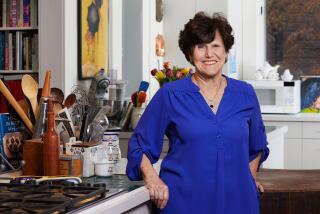Jewish Mother : Soup Targets Wider Market: Will Go Kosher
- Share via
Jewish Mother’s Chicken Soup has found religion--to please the Gentiles.
Its name notwithstanding, Jewish Mother’s Chicken Soup until recently was no more kosher than a ham sandwich. But after a year of production, the Anaheim maven who created non-kosher Jewish Mother’s Chicken Soup has decided that health-conscious yuppies would rather sup on the real stuff.
For the record:
12:00 a.m. Nov. 12, 1987 FOR THE RECORD
Los Angeles Times Thursday November 12, 1987 Home Edition Business Part 4 Page 2 Column 6 Financial Desk 1 inches; 30 words Type of Material: Correction
Jewish Mother’s Chicken Soup plans to produce a kosher soup and discontinue production of non-kosher soup. Because of an editing error, a story in Friday’s editions incorrectly described the company’s plans.
Ruth Feinberg--and many food industry experts--believe that a growing number of non-Jews concerned about health and nutrition are noshing on kosher food because of the strict Jewish dietary laws it must satisfy.
Within the next month, Feinberg and her distributor, Cerritos-based Young’s Market Co., plan to have 49,500 bright-yellow cans of authentic kosher soup on shelves in 400 California grocery stores. Jewish Mother’s will be the only kosher chicken soup produced on the West Coast.
By actively pursuing kosher and non-kosher consumers alike, Feinberg, hopes to snare a bigger slice of the kosher product market, which has been on a roll.
Nationally, the kosher industry generates $1.5 billion in annual sales, up 75% since 1982, according to the New York-based Union of Orthodox Jewish Congregations of America, which supervises production of about 80% of the country’s 17,000 kosher products.
And the market eventually could grow to three times its current size, said John McMillin, a food industry analyst at Prudential-Bache Securities in New York.
Part of the reason for the boom is the growing number of Jews who observe kosher dietary law.
But not only Jews buy kosher food. Studies by Bronx, N.Y.-based National Foods Corp.--a major producer of kosher food products, including the Hebrew National line--indicate that 70% of kosher food is consumed by non-Jewish households.
“In an age of you are what you eat, clearly some people are starting to read the labels,” said McMillin. “The (kosher) seal does signify quality, where a special effort has been made . . . and anything that signifies quality helps in this day and age.”
So with demand growing like dandelions, Feinberg, 48, decided this year that it was time for Jewish Mother’s Chicken Soup to go back to the good old ways.
She started small. Thirty-five years ago, Feinberg began using her grandmother’s recipe to make the soup for restaurants. Her one-woman operation began spiraling in 1983, when Feinberg began mixing up 75 to 100 quarts daily for customers at an Anaheim eatery that she managed.
Customers suggested to her that the soup could be packaged and sold. By 1986, Feinberg had signed an exclusive marketing agreement with Young’s Market, and production began last November.
By last month, Young’s had hit its 12-month target to sell 6,000 cases of the soup, mostly in Southern California. Cans are now in 300 California stores, including Safeway, Pantry and Gelson’s, plus half a dozen markets in New York, Arizona and Minnesota.
Still, Feinberg is a long way from becoming the Mrs. Fields of chicken soup.
The problem? “People on the East had been telling us they would buy it if we would just go kosher,” said Peter H. Young, president of Young’s specialty foods division.
But kosher chicken costs as much as $2.40 per pound--at least double the price of non-kosher fowl. And one of the big snags in marketing Feinberg’s soup is that it already retails for $2.79 to $3.40 for a single 29-ounce can. By comparison, a 26-ounce can of Campbell’s chicken noodle soup sells for less than 90 cents.
Young said he decided to “bite the bullet” and market a kosher version of Jewish Mother’s Chicken Soup at the same price and cut his profit by about 10%.
So Feinberg last month enlisted some of the toughest food inspectors in the country--two rabbis from the Orthodox Union--to oversee production at Old Rancher’s Cannery. The cannery, in Upland, is a small, old-fashioned plant that usually processes “squid, salsa, menudo-- all kinds of non-kosher things,” said Carolyn Crenwelge, production coordinator.
That meant Old Rancher’s had to meet the kashrut, or Jewish dietary laws, a maddeningly difficult art that begins with rabbis inspecting the ingredients and equipment. Even if everything passes muster, all plant equipment must be sterilized with steam and boiling water, then disinfected with an iodine solution.
The equipment at Old Rancher’s Cannery was scrubbed from top to bottom. Items that couldn’t be scrubbed--such as a can opener--were replaced. The overhaul was necessary to make sure that Jewish Mother’s would have the right to carry the “OU” seal of kosher approval.
“Consumers have no idea what goes on inside a plant,” said Rabbi Arye Weiner, West Coast kashrut supervisor for the Orthodox Union. “Once we put our name on the line, the product is pure beyond a shadow of a doubt.”
Finally, four days after the rabbis descended on the plant, Feinberg and her team had made almost 50,000 cans of kosher soup.
At least that’s what they thought. As it turned out, the rabbis now suspect that the kosher guarantee by Feinberg’s wholesale chicken supplier--Shelat Kosher Foods of Chicago--was a bunch of baloney. Shelat may have been selling non-kosher fowl.
Depending on what the rabbis decide, in two weeks Feinberg may have to start the entire re-koshering process again with chicken from another supplier. If so, last month’s batch will be sold as non-kosher. The setback would be costly but not critical since Feinberg was going to continue marketing a non-kosher line anyway.
Whether Jewish Mother’s Chicken Soup will succeed nationally remains to be seen. If the kosher product really catches on, annual sales could triple to 25,000 cases within a year and to 50,000 cases five years from now, Young said.
Others aren’t quite that optimistic. John Jablonowski, a buyer for Medford, N.J.-based Haddonhouse Food Products, which sells Jewish Mother’s, doesn’t foresee a dramatic sales upswing. “Maybe 10, 15, 20%,” he estimated.
“But it’s a catchy name,” Jablonowski added. “And if the consumer sees two cans of chicken soup--and they’re equal in cost and everything else--he may choose the kosher, thinking it must be a little bit better.”
More to Read
Eat your way across L.A.
Get our weekly Tasting Notes newsletter for reviews, news and more.
You may occasionally receive promotional content from the Los Angeles Times.










